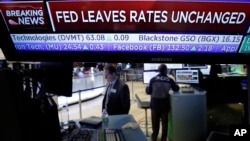The U.S. Federal Reserve Bank will leave interest rates unchanged for now, but also acknowledged Wednesday that consumer and business sentiment have improved since President Donald Trump was inaugurated.
New economic data released by the government bolsters the case for a rate increase soon, economists said. But while the U.S. job market continues to show improvement, the Fed gave little direction on when it might raise the federal funds rate - the interest rate it charges banks for overnight loans.
In a statement following its two-day meeting this week, the Federal Open Market Committee (FOMC) said it expects "economic conditions to evolve in a manner that will warrant gradual [interest-rate] increases when inflation reaches the Fed's target rate of 2 percent." The index used by the Fed currently measures inflation at 1.6 percent annually.
Bankrate.com's chief financial analyst, Greg McBride, said inflation could be the wild card - an unpredictable factor - for the Fed in 2017. But he added that some of the uncertainty revolves around questions surrounding future White House policy.
"The Fed will have a difficult time raising interest rates further as long as there is guesswork about what the fiscal stimulus will look like," said McBride.
Payroll processing firm ADP said private companies added 246,000 new workers to their payrolls in January, exceeding economists' expectations of about 165,000 new hires.
PNC Financial Services went further, predicting the U.S. economy will reach full employment this year. That tightening of the American labor market would likely prompt businesses to raise wages to attract new workers. And since higher wages tend to accelerate inflation, economists say that could persuade the U.S. central bank to raise interest rates at a faster pace.
The Fed raised its key interest rate only once last year, by one-quarter of one percent in December. The Fed expects to raise rates three times in 2017. A survey of investors conducted by Bloomberg suggests there's a 38 percent chance that the first rate hike in 2017 will come at the central bank's next board meeting, in March.
The bank's federal funds rate is important for consumers and businesses because it influences borrowing costs for mortgages, car loans and credit cards. Economists say lower rates tend to stimulate economic growth, which can drive up inflation, while higher rates help to lower inflation while boosting yields for bonds and savings accounts.
US Federal Reserve Keeps Interest Rates Unchanged for Now
- By Mil Arcega

WASHINGTON —



